Individualist feminism is a libertarian feminist tradition that emphasizes individualism, personal autonomy, choice, consent, freedom from state-sanctioned discrimination against women, and equality under the law. It also opposes what is considered political or gender feminism.

Catharine Esther Beecher was an American educator known for her forthright opinions on female education as well as her vehement support of the many benefits of the incorporation of kindergarten into children's education. She published the advice manual The American Woman's Home with her sister Harriet Beecher Stowe in 1869. Some sources spell her first name as "Catherine".

Mixed-sex education, also known as mixed-gender education, co-education, or coeducation, is a system of education where males and females are educated together. Whereas single-sex education was more common up to the 19th century, mixed-sex education has since become standard in many cultures, particularly in Western countries. Single-sex education remains prevalent in many Muslim countries. The relative merits of both systems have been the subject of debate.
Liberal feminism, also called mainstream feminism, is a main branch of feminism defined by its focus on achieving gender equality through political and legal reform within the framework of liberal democracy. It is often considered culturally progressive and economically center-right to center-left. As the oldest of the "Big Three" schools of feminist thought, liberal feminism has its roots in 19th century first-wave feminism that focused particularly on women's suffrage and access to education, and that was associated with 19th century liberalism and progressivism. Liberal feminism "works within the structure of mainstream society to integrate women into that structure." Liberal feminism places great emphasis on the public world, especially laws, political institutions, education and working life, and considers the denial of equal legal and political rights as the main obstacle to equality. As such liberal feminists have worked to bring women into the political mainstream. Liberal feminism is inclusive and socially progressive, while broadly supporting existing institutions of power in liberal democratic societies, and is associated with centrism and reformism. Liberal feminism tends to be adopted by white middle-class women who do not disagree with the current social structure; Zhang and Rios found that liberal feminism with its focus on equality is viewed as the dominant and "default" form of feminism. Liberal feminism actively supports men's involvement in feminism and both women and men have always been active participants in the movement; progressive men had an important role alongside women in the struggle for equal political rights since the movement was launched in the 19th century.
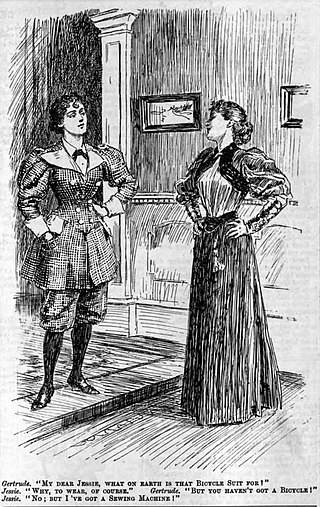
Victorian dress reform was an objective of the Victorian dress reform movement of the middle and late Victorian era, led by various reformers who proposed, designed, and wore clothing considered more practical and comfortable than the fashions of the time.
First-wave feminism was a period of feminist activity and thought that occurred during the 19th and early 20th century throughout the Western world. It focused on legal issues, primarily on securing women's right to vote. The term is often used synonymously with the kind of feminism espoused by the liberal women's rights movement with roots in the first wave, with organizations such as the International Alliance of Women and its affiliates. This feminist movement still focuses on equality from a mainly legal perspective.
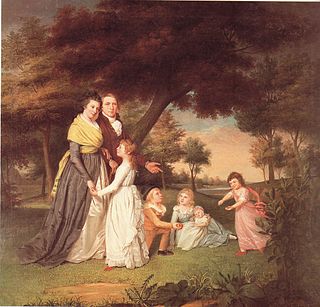
"Republican Motherhood" is an 18th-century term for an attitude toward women's roles present in the emerging United States before, during, and after the American Revolution. It centered on the belief that the patriots' daughters should be raised to uphold the ideals of republicanism, in order to pass on republican values to the next generation. In this way, the "Republican Mother" was considered a custodian of civic virtue responsible for upholding the morality of her husband and children. Although it is an anachronism, the period of Republican Motherhood is hard to categorize in the history of feminism. On the one hand, it reinforced the idea of a domestic women's sphere separate from the public world of men. On the other hand, it encouraged the education of women and invested their "traditional" sphere with a dignity and importance that had been missing from previous conceptions of women's work.
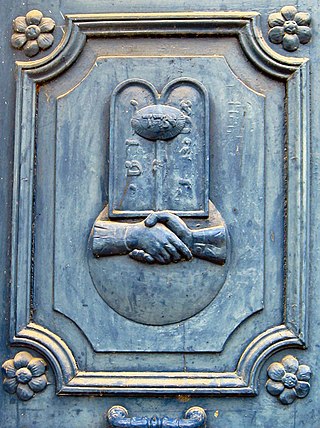
The Alliance Israélite Universelle is a Paris-based international Jewish organization founded in 1860 with the purpose of safeguarding human rights for Jews around the world. It promotes the ideals of Jewish self-defense and self-sufficiency through education and professional development. The organization is noted for establishing French-language schools for Jewish children throughout the Mediterranean, Iran, and the former Ottoman Empire in the 19th and early-20th centuries.
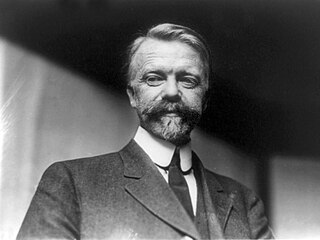
Luther Halsey Gulick Jr. (1865–1918) was an American physical education instructor, international basketball official, and founder with his wife of the Camp Fire Girls, an international youth organization now known as Camp Fire.

Dame Sarah Elizabeth Siddons Mair was a Scottish campaigner for women's education and women's suffrage. She was active in the Edinburgh Association for the University Education of Women and the Ladies' Edinburgh Debating Society, which she founded before she was 20.
The history of feminism in Canada has been a gradual struggle aimed at establishing equal rights. The history of Canadian feminism, like modern Western feminism in other countries, has been divided by scholars into four "waves", each describing a period of intense activism and social change. The use of "waves" has been critiqued for its failure to include feminist activism of Aboriginal and Québécois women who organized for changes in their own communities as well as for larger social change.
Feminism in Egypt has involved a number of social and political groups throughout its history. Although Egypt has in many respects been a forerunner in matters of reform particularly "in developing movements of nationalism, of resistance to imperialism and of feminism," its development in fighting for equality for women and their rights has not been easy.

The Norwegian Association for Women's Rights is Norway's oldest and preeminent women's and girls' rights organization and works "to promote gender equality and all women's and girls' human rights through political and legal reform within the framework of liberal democracy." Founded in 1884, NKF is Norway's oldest political organization after the Liberal Party. NKF stands for an inclusive, intersectional and progressive mainstream liberal feminism and has always been open to everyone regardless of gender. Headquartered at Majorstuen, Oslo, NKF consists of a national-level association as well as regional chapters based in the larger cities, and is led by a national executive board. NKF has had a central role in the adoption of all major gender equality legislation and reforms since 1884.
Shortly after feminist ideology started gaining popularity in the mid-19th and early 20th century in the United Kingdom of Great Britain and Ireland and the United States, and slowly the rest of the world, the movement begun affecting changes to the social and political life of Greece. In 1952, Greek women gained the right to vote. However, other changes did not come until a few decades later, as with, for example, the introduction of sweeping changes in family law in 1983. Greece signed the Convention on the Elimination of All Forms of Discrimination against Women and ratified it in 1983.

The lives of Palestinian women have transformed throughout many historical changes including Ottoman control, the British Mandate, and Israeli occupation. The founding of the Palestine Liberation Organization in 1964 and the later establishment of the Palestinian Authority in 1994 also played a role in redefining the roles of women in Palestine and across the Palestinian diaspora. Women have been involved in resistance movements in Palestine as well as in Jordan, Syria, and Lebanon throughout the 20th century and into the 21st century.

A Ladies' Memorial Association (LMA) is a type of organization for women that sprang up all over the American South in the years after the American Civil War. Typically, these were organizations by and for women, whose goal was to raise monuments in Confederate soldiers honor. Their immediate goal, of providing decent burial for soldiers, was joined with the desire to commemorate the sacrifices of Southerners and to propagate the Lost Cause of the Confederacy. Between 1865 and 1900, these associations were a formidable force in Southern culture, establishing cemeteries and raising large monuments often in very conspicuous places, and helped unite white Southerners in an ideology at once therapeutic and political.

Kallirhoe Parren launched the feminist movement in Greece and was a journalist and writer in the late 19th and early 20th century.
Feminism in Germany as a modern movement began during the Wilhelmine period (1888–1918) with individual women and women's rights groups pressuring a range of traditional institutions, from universities to government, to open their doors to women. This movement culminated in women's suffrage in 1919. Later waves of feminist activists pushed to expand women's rights.
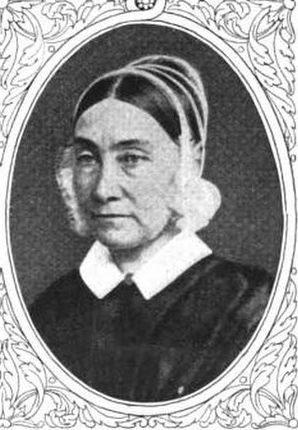
Sarah Pugh was an American abolitionist, activist, suffragist, and teacher. She was involved with promoting the free produce movement, including a boycott on sugar produced by slave labor. She was a leader of the Philadelphia Female Anti-Slavery Society from its earliest days in 1835 until it closed in 1870. Along with Lucretia Mott, Pugh was one of the delegates to the World Anti-Slavery Convention in London who were denied their seats because they were women.











